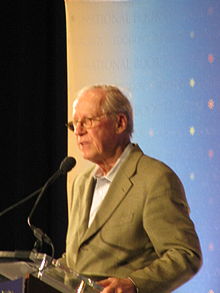Richard Moe | |
|---|---|
 Moe in 2014 | |
| Chief of Staff to the Vice President | |
| In office January 20, 1977 –January 20, 1981 | |
| Vice President | Walter Mondale |
| Preceded by | Ann C. Whitman |
| Succeeded by | Daniel J. Murphy |
| Chair of the Minnesota Democratic–Farmer–Labor Party | |
| In office 1969–1972 | |
| Personal details | |
| Born | Richard Palmer Moe November 27,1936 Duluth,Minnesota,U.S. |
| Political party | Democratic |
| Spouse | Julia Neimeyer (m. 1964) |
| Children | 2 |
| Education | Williams College (BA) University of Minnesota (JD) |
Richard Palmer Moe (born November 27, 1936) is an American attorney and historic preservation advocate who served as chief of staff to the vice president from 1977 to 1981. [1] [2]